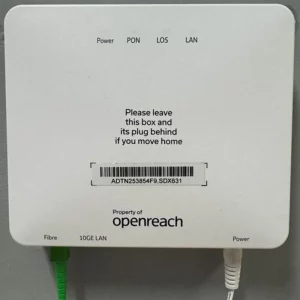Sponsored Links
Vodafone UK Adult Content Block Hits Internet Clothes and Underwear Sites
Posted: 01st Dec, 2011 By: MarkJ

 Mobile operator Vodafone UK, and possibly other Mobile Broadband providers, have been accused of being too aggressive with their internet adult content filter after it was discovered to be blocking legitimate commercial websites for two leading clothes and underwear retailers (Bravissimo and Figleaves).
Mobile operator Vodafone UK, and possibly other Mobile Broadband providers, have been accused of being too aggressive with their internet adult content filter after it was discovered to be blocking legitimate commercial websites for two leading clothes and underwear retailers (Bravissimo and Figleaves).The issue was discovered by a well known digital rights and policy activist, James Firth, whom came across the restriction while using an iPhone connected to the Vodafone network. Customers can of course opt-out of the block, although we found Vodafone's procedure for this to be very tedious and it also makes all internet porn available again. The kids probably already know how to circumvent such blocks anyway.
In fairness we've often wondered about how ISPs would approach the thorny issue of underwear. We all wear it, men, women and child alike (well.. some don't :glee:), but we've also all seen "those catalogues" and the images inside. It's interesting to debate whether or not such things should be blocked.
Let's not forget that Children can see and buy related items in the shops, just as readily as almost any other piece of clothing, which often also feature big posters with similar imagery. As a result the vast majority of us grow up viewing it as normal and not something that is overtly pornographic. We don't know of any High Street stores that hide this away in a private section.
Open Digital's James Firth said:
"Voluntary" blocking schemes operate with no transparency and oversight, and website owners usually only find out by accident their sites are blocked. My own blog slightlyrightofcentre.com, a blog which often focusses on issues of web censorship, was itself blocked for a while by T-mobile's adult content system, until I kicked up a fuss.
Open Digital has a policy position on this, calling for such filters to offer transparency of the sites they block. ISPs offering filtering should provide a mechanism for website owners to test if their websites are blocked, and a dispute resolution service so that sites who find themselves unfairly blocked can get themselves unblocked, and quickly.
I'm hearing disturbing news that Downing Street policy chiefs want to expand adult content filtering systems to fixed-line ISPs too, in a move designed to attract female voters. I think it's safe to assume such policies are being developed by men, as the women I spoke to on this issue aren't convinced by a policy which blocks them from their shopping."
"Voluntary" blocking schemes operate with no transparency and oversight, and website owners usually only find out by accident their sites are blocked. My own blog slightlyrightofcentre.com, a blog which often focusses on issues of web censorship, was itself blocked for a while by T-mobile's adult content system, until I kicked up a fuss.
Open Digital has a policy position on this, calling for such filters to offer transparency of the sites they block. ISPs offering filtering should provide a mechanism for website owners to test if their websites are blocked, and a dispute resolution service so that sites who find themselves unfairly blocked can get themselves unblocked, and quickly.
I'm hearing disturbing news that Downing Street policy chiefs want to expand adult content filtering systems to fixed-line ISPs too, in a move designed to attract female voters. I think it's safe to assume such policies are being developed by men, as the women I spoke to on this issue aren't convinced by a policy which blocks them from their shopping."
In the meantime Bravissimo and Figleaves could be losing money, especially when some supermarket websites, which feature similar content, still appear to be available. It seems that being big can sometimes make you immune to censorship, which hardly seems fair.
What do readers think? Should mobile operators and ISPs block sites that feature underwear? More to the point, have any of you spotted identical restrictions on different operators? We've already tried Three (3) but they did not appear to restrict underwear sites.
Search ISP News
Search ISP Listings
Search ISP Reviews
Latest UK ISP News








Cheap BIG ISPs for 100Mbps+
150,000+ Customers | View More ISPs
Cheapest ISPs for 100Mbps+
Modest Availability | View More ISPs
Latest UK ISP News
Helpful ISP Guides and Tips
Sponsored Links
The Top 15 Category Tags
- FTTP (6843)
- BT (3900)
- Politics (3093)
- Business (2789)
- Openreach (2679)
- Building Digital UK (2522)
- Mobile Broadband (2495)
- FTTC (2147)
- Statistics (2143)
- 4G (2110)
- Virgin Media (2038)
- Ofcom Regulation (1788)
- 5G (1753)
- Fibre Optic (1609)
- Wireless Internet (1602)
Sponsored
Copyright © 1999 to Present - ISPreview.co.uk - All Rights Reserved - Terms , Privacy and Cookie Policy , Links , Website Rules































